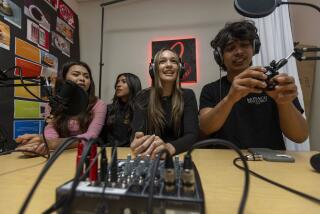School’s Oral History Project Helps Generations Bridge the Gap
- Share via
Several months ago, I wrote a piece in this space pointing out that millions of American seniors are walking oral histories and deploring the fact that so many of us are never questioned about events we witnessed and felt firsthand.
Not altogether so, wrote Hazel Ray of Corona del Mar, who told me about a program at Harbor View Elementary School in which all sixth-graders are required to select and interview in depth someone at least 50 years older than they are. The interviews are then written and the interviewees presented at a special Christmas program at the school.
Says Hazel Ray: “My 11-year-old grandson, David, chose me to interview this past year, and I shall always cherish one of his comments: ‘Doing a report with my grandma brings good things to my mind. She is not just a very good grandmother, she’s a wonderful friend.’ I find this school project very heartwarming, and I wish it could be in the curriculum of every school.”
In a few weeks, says Marilyn von KleinSmid-Randolph, the exuberant sixth-grade teacher who coordinates this program, the current crop of interviewers and their subjects will celebrate at the ninth annual oral history tea party. The sixth-graders will sing special songs for their guests, and then each pair will stand up and the student interviewer will tell the audience one special thing about his or her guest.
Over the years, Von Klein-Smid-Randolph says, some interesting qualities have been singled out by the children to highlight their guests. Among them: the second person to receive a pilot’s license in the state of Montana, the winner of a Silver Pass to Disneyland, a championship skier in the 1914 Olympic Games and the originator of the docent program at Bowers Museum.
Chuck Jones, the creator of Bugs Bunny, was discovered in retirement in Laguna Beach and brought before the class. So have been Don Callendar, founder of Marie Callendar restaurants; poet Duncan Stuart and ice-skater Michael Kirby. James Roosevelt, who appeared with his sixth-grade daughter, Becky, qualified under the 50-year restriction.
Most of the interviewees have not been famous--except, perhaps, to their grandchildren or their young friends. But all of them had something of wonder from their past lives that intrigued the young people who brought them. “There were lots of war experiences,” Von KleinSmid-Randolph says.
There were also remarkable facts extracted by the young interviewers. One guest, for example, had once picked up his mail by swimming from Balboa Island to the peninsula each day. Another piece of history that fascinated a student interviewer was the fact that his subject had grown up playing in vacant lots. The students didn’t know what a vacant lot was, and it had to be explained to them.
And there was the guest who startled his young listeners by telling them that when he was in sixth grade, he got rapped across the knuckles with a ruler if he got out of line. And the grandfather who told the kids their biggest problem today is that they don’t have enough to do; some regular chores, he explained, would take care of that situation. They listened--but they were more engaged by the guest who said that she used to pay her way into a movie and have both popcorn and candy for less than 50 cents.
“When it’s over,” Von Klein-Smid-Randolph says, “the kids feel so much closer to these older people. I remember one little boy telling me in wonder that ‘I never knew my grandfather liked so many of the same things that I do.’ ”
The program was started 9 years ago when one of the Harbor View teachers went to a forum on gifted children and brought back this idea. It was successful from the beginning and has now become a tradition at Harbor View. All four sixth-grade classes participate, and the only direction the students get is a packet giving them some idea of the type of questions to ask. After that, they’re on their own to follow up their own inclinations about what interests them.
“They usually go to their grandparents first,” Von KleinSmid-Randolph says, “but sometimes they find their subjects at a senior citizens center. Either way, they discover how much these older people have to share.”
I suspect this is a mutual voyage of enlightenment, and the seniors who are open to their own sense of discovery can learn much about their interrogators too. That kind of exchange can certainly shrink the areas of ignorance and intolerance, and Harbor View School earns lots of points for fostering and supporting such a program.






